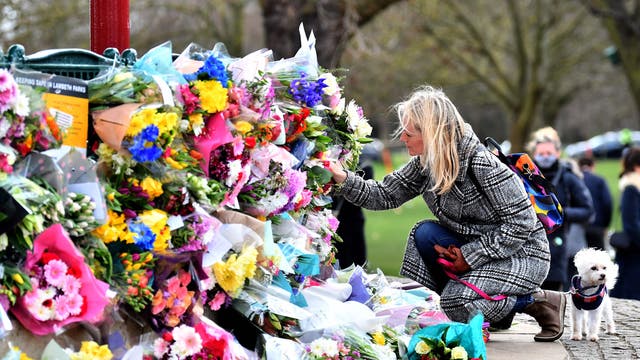The arrests of female attendees after Scotland Yard refused to facilitate a socially-distanced event planned by Reclaim These Streets has sparked an independent investigation following a backlash from the public and MPs.
Sir Stephen House, deputy commissioner of the Metropolitan Police, said the force would support the independent probe but he believed the officers present were “doing their duty as they saw it”.
“I can’t apologise for my officers,” he told the London Assembly Police and Crime Committee on Wednesday.
“I am sorry of course that people are so upset at seeing officers enforcing legislation but the officers were doing their duty as they saw it and I will not second guess that at this moment in time.”
A vigil originally organised by a group called Reclaim These Streets for 6pm on the day was cancelled after the Metropolitan Police refused to facilitate it and said it would be illegal under coronavirus laws.
But hundreds of people left flowers for Ms Everard at Clapham Common’s bandstand, near where she disappeared, through the day on Saturday and a large crowd gathered in the early evening.
Sir Stephen told the committee that between midday and 6pm the vigil had complied with Covid regulations, but that people then started to make speeches from the bandstand and caused the crowd to draw together.
”We believe that when the crowd density increased, Covid regulations were no longer being followed,” he said, adding that officers were then faced with an “incredibly difficult situation” and had been met with abuse for trying to disperse the crowds.
Sir Stephen said that officers had tried to issue fines but when people refused to give their names and addresses, they were left with a choice of dropping the fines or making arrests.
He added: “The officers decided to proceed and make arrests for failing to give the information and also in one case a public order offence.”
While largely peaceful, the vigil was marred by scuffles, with police officers accused of heavy-handedness after some women were bundled to the ground and handcuffed.
Tributes paid to Sarah Everard at Clapham Common vigil
Show all 36

Sir Stephen told the committee: “I understand that their actions have upset people and we see the evidence of that on a daily basis and we do not underestimate the upset that has been caused.
“But the officers took their actions believing they were doing the right thing to protect people’s health, they were following legislation put in place by Parliament to protect the public in the middle of a health crisis. That health crisis has not yet gone away.”
The current lockdown law in England neither explicitly ban or explicitly allow protest, and human rights groups have called for police to facilitate demonstrations.
Reclaim These Streets organisers, who were threatened with £10,000 fines and potential prosecutions, asked the High Court to rule on the correct interpretation of the regulations on Friday.
A judge refused to make a formal declaration but said the Metropolitan Police could facilitate protest during England’s lockdown.
Sir Thomas Winsor, HM chief inspector of constabulary, is to carry out a review into the way the event on Clapham Common was policed after senior politicians including Priti Patel and London mayor Sadiq Khan raised concerns.
Sir Stephen said the force fully supports the independent review and added that it was already passing on the information required.
(PA)
He said: “We want to ensure that the facts of what happened are fully understood, that we are completely transparent in what happened, and that the public understand why we acted as we did.”
Sir Stephen also said there was a sense of “disbelief, anger and betrayal” in the force that an officer had been charged with the kidnap and murder of Ms Everard.
Serving Metropolitan Police officer Wayne Couzens, 48, has been charged with Ms Everard’s kidnapping and murder and will go on trial later this year.
An unnamed police officer is under investigation by the Independent Office of Police Conduct (IOPC) for allegedly sharing an “inappropriate graphic” in relation to the case.









